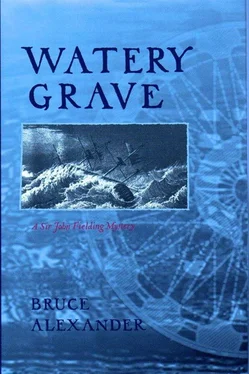Bruce Alexander - Watery Grave
Здесь есть возможность читать онлайн «Bruce Alexander - Watery Grave» весь текст электронной книги совершенно бесплатно (целиком полную версию без сокращений). В некоторых случаях можно слушать аудио, скачать через торрент в формате fb2 и присутствует краткое содержание. Год выпуска: 1996, ISBN: 1996, Издательство: Putnam, Жанр: Исторический детектив, на английском языке. Описание произведения, (предисловие) а так же отзывы посетителей доступны на портале библиотеки ЛибКат.
- Название:Watery Grave
- Автор:
- Издательство:Putnam
- Жанр:
- Год:1996
- ISBN:9780399141553
- Рейтинг книги:3 / 5. Голосов: 1
-
Избранное:Добавить в избранное
- Отзывы:
-
Ваша оценка:
- 60
- 1
- 2
- 3
- 4
- 5
Watery Grave: краткое содержание, описание и аннотация
Предлагаем к чтению аннотацию, описание, краткое содержание или предисловие (зависит от того, что написал сам автор книги «Watery Grave»). Если вы не нашли необходимую информацию о книге — напишите в комментариях, мы постараемся отыскать её.
Watery Grave — читать онлайн бесплатно полную книгу (весь текст) целиком
Ниже представлен текст книги, разбитый по страницам. Система сохранения места последней прочитанной страницы, позволяет с удобством читать онлайн бесплатно книгу «Watery Grave», без необходимости каждый раз заново искать на чём Вы остановились. Поставьте закладку, и сможете в любой момент перейти на страницу, на которой закончили чтение.
Интервал:
Закладка:
All this struck me as passing strange, as indeed it seemed to do Lady Fielding, as well, for we two exchanged puzzled glances at his remarks. The crewmen seemed less puzzled than disturbed. A few dared turn their heads, exhibiting sullen looks to one another. One or two appeared downright angry.
“If any of you has information on these matters,” said the speaker, “I invite you to step forward no’w.”
He waited. None stepped forward.
“So be it,” said he.” But know that my office is open to any and all. What I am told in private will be kept in confidence.” Again he paused, this time no doubt to give weight to what he had said. Then he resumed: “All this aside, I wish you to know you have done your duty to your ship, your King, and your country. We are proud. Boatswain?”
As the man with the whistle stepped up to pipe another tune, the speaker moved forward, broke the ranks of the crewmen, and disappeared down the same ladder they had ascended. The last I saw of him, he was sitting in the boat conveyed by its eight oarsmen back to the frigate.
That struck me as odd. And odd, too, that he had not mentioned the captain as another for whom they had done their duty.
Then the boatswain whistled another tune and the band struck up again. With that, all thoughts of what was odd, strange, or puzzling in what I had just seen and heard suddenly left me, for crew members and the waiting crowd swarmed together. I was buffeted away Irom Lady Fielding and near knocked down in the rush.
When I managed again to locate her, she had attached herself to a young man of fair aspect some inches taller than I was then. He quite dominated his mother, who was even shorter than I, yet she clung to him, embracing him, squeezing him so tight that I thought she might rob him of his very breath. He took it well. Smiling and laughing throughout her attack, he pulled away at last and, holding her hands clasped in his own, began talking earnestly to her. She responded passionately, pulling a hand away to wipe the tears from her eyes. All this I saw, but none of it I heard, for I thought it best to keep a polite distance from this touching occasion until such time as my presence should be wanted. Through it all the band played on.
Lady Fielding had remarked to me but two evenings before that her last sight of her son, Tom, had been at the Old Bailey. When he was led from the courtroom in the company of two others, she’d been sure — because the judge had declared it-that he would be hanged.
I recall that we were in the kitchen, drinking a last pot of tea. Mrs. Gredge, cook and housekeeper, had retired for the night. Sir John was below, conferring on some matter with Mr. Bailey, the captain of the Bow Street Runners. Though I knew the circumstances regarding her son from Sir John, she had never before discussed these things with me, so painful were they in her memory.
“You may believe me, Jeremy,” she had said to me, “when I tell you that when I saw my son, my only child, taken from the courtroom in chains to what seemed his certain dea.th — tat, my dear young friend, was the darkest moment of my life. He was but a boy, younger than you are now, and his young life was to be taken — and for what? For a few shillings, perhaps a pound, that he intended to give me, his mother, so that we might not starve further. In all truth, I cared not then whether I lived or died. Nay, I wished to be dead and would, I’m sure, have ended my life — had it not been for Jack.”
She referred to Sir John. So she called him, and so had the first Lady Fielding, as well, during those few weeks I knew her before her death.
Sir John Fielding had urgently petitioned the Lord Chief Justice for the lives of the three boys, out of respect to their young years — the eldest was but fourteen. He had managed to save others as young for a life on the sea in the Royal Nayy. Queen Charlotte herself had expressed her royal approval of this form of clemency, and the King had knighted the Magistrate of the Bow Street Court in recognition of it. And so the Lord Chief Justice was well prepared when Sir John brought his petition and arguments before him; yet he resisted them powerfully.
He resisted not from pure obduracy, or hardness of heart, but because in the course of the robbery bodily harm had been done to the victim, a shopkeeper. When the victim resisted, the eldest of the boys had dealt the shopkeeper great blows with a stout club he carried. A wound was opened on the man’s scalp and his leg was broken. He was quite unable to pursue them, of course, but the boys, frightened at their crime, had run from the shop. The hue and cry was raised, and they were apprehended.
In the end, it was the shopkeeper’s testimony that proved the salvation of two of the three. He gave it in court that the younger two of them were quite horrified at what the eldest had done and had wrestled the club from him ere he did further hurt to the poor man. Sir John had argued to the Lord Chief Justice that in this way two of them had demonstrated that while they were party to the robbery, they could not be blamed for the bodily harm inflicted upon the shopkeeper. The Lxjrd Chief Justice had reluctantly admitted the point had some merit and signed an order remitting Jonah Falkirk and Thomas Durham to duty in the Royal Navy. Thus they were saved. John Dickey, aged fourteen, was hanged at Tyburn two days after his fellows set sail from Portsmouth on the H.M.S. Adventure .
All this I had heard from Sir John, yet in the year I had shared the same roof with Lady Fielding she had never made direct reference to the matter, and indeed had never discussed her feelings regarding it until that recent evening in the kitchen over our pot of tea. She had continued only a bit further, explaining that Sir John had not informed her of his efforts on her son’s behalf until they were successful.
“He wanted to arouse no false hope in me, should they fail,” said she.” It was probably best so, yet had he known the depths of my despair he might have thought otherwise. Yet when he summoned me to Bow Street and informed me of his success — that is, his partial success — it was as if he had given me my life, given me a reason to live. It was the kindest act ever a man could do for a boy and his mother.”
She was silent then for more than a minute, so long in fact that I rose from the table and gathered my cup and the empty teapot and began to prepare for washing up.
Yet she resumed one last time: “And to think that that same good, kind, generous man should take me for his wife, knowing my history — that is, to me, a fair marvel of fortune. There Is no telling, Jeremy, what fate has in store for any of us.”
“And well I know that,” I said to her.
She smiled then at me the most serious of smiles.” And well you must,” she had agreed.
So it was we had had our talk two evenings past. How was I then to interrupt her reunion with her son there on the Tower Wharf? I held back until Lady Fielding looked around her, clearly wondering where I had got to.
Only then did I come forward. The wharf was emptvnng quickly. The crewmen who had been landed formed a line before an officer who sat at a table right there on the wharf.
“I must join the tail end of the pay line, ” said Tom to her, “else my three years will be for naught.”
“Go, Tom,” said she to him.” Jeremy’ will collect our hackney, and I shall wait for you here.”
He smiled and nodded at his mother as he backed off in the direction of the pay line.
To me he said: “Jeremy, take my ditty box with you to the hackney. It is all the baggage I have.” He pointed down at the object at my feet.
To her credit. Lady Fielding stepped forward and said, “Tom, Jeremy is not a servant. Please form that as a request, and I am sure he will be glad to oblige.”
Читать дальшеИнтервал:
Закладка:
Похожие книги на «Watery Grave»
Представляем Вашему вниманию похожие книги на «Watery Grave» списком для выбора. Мы отобрали схожую по названию и смыслу литературу в надежде предоставить читателям больше вариантов отыскать новые, интересные, ещё непрочитанные произведения.
Обсуждение, отзывы о книге «Watery Grave» и просто собственные мнения читателей. Оставьте ваши комментарии, напишите, что Вы думаете о произведении, его смысле или главных героях. Укажите что конкретно понравилось, а что нет, и почему Вы так считаете.












